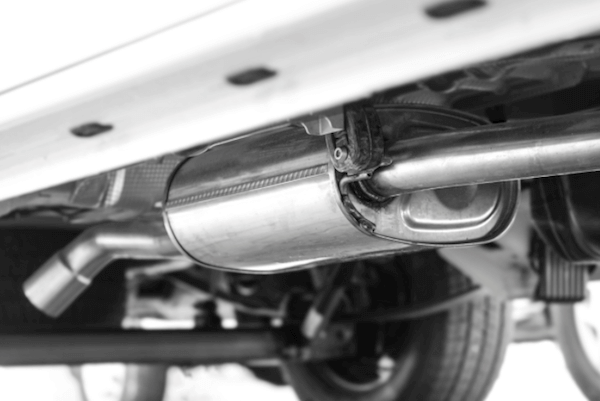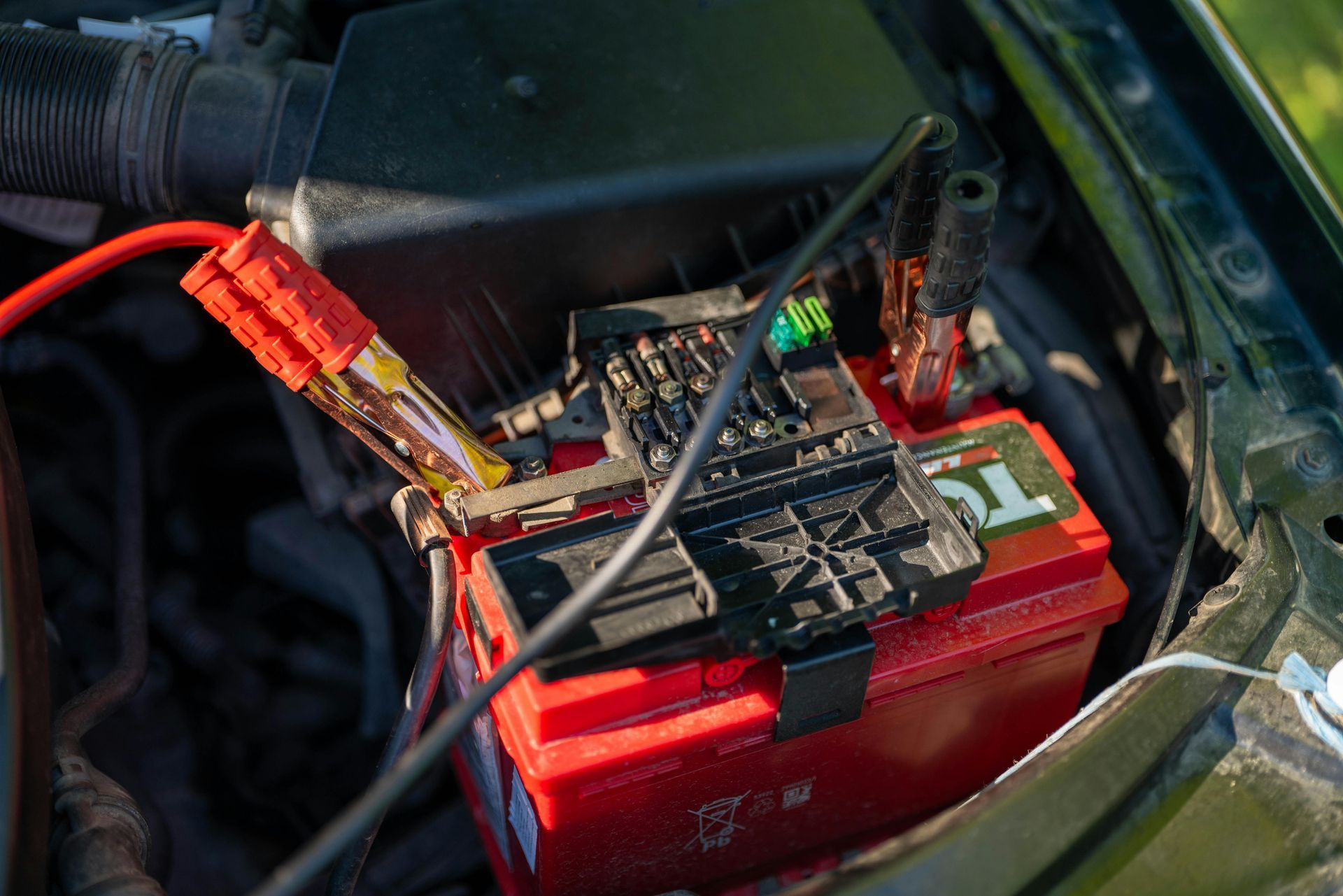Catalytic Converter Theft: Everything You Need To Know
Auto Shops Located in: Chapel Hill, Durham, Taleigh, Apex, and Cary North Carolina

Here at Chapel Hill Tire, we work to keep our customers up-to-date on automotive industry insights. While some weeks we get to share uplifting information, this week we are here to discuss a more serious problem facing drivers: catalytic converter theft. Here is everything you need to know about this issue and what you can do to stay protected.
Why Are Catalytic Converters Being Stolen?
Your catalytic converter is an essential part of your vehicle, designed to reduce the pollutants and toxic gas your emissions system produces. It uses precious metals like platinum, rhodium, and palladium to complete this process. People have been stealing catalytic converters off of cars to sell these metals for scraps.
While this has been happening for years, a recent uptick in catalytic converter theft may be motivated by economic turbulence from the pandemic. Additionally, the reduced foot traffic during this time may make it easier for thieves who feel less likely to be caught. It takes just a few minutes for a thief to saw the catalytic converter out of your car and leave you with thousands of dollars in damage.
Which Cars Are Targeted for Catalytic Converter Theft?
The Toyota Prius is the most targeted car for catalytic converter theft. As a low-emissions vehicle, Prius converters contain larger amounts of the precious metals platinum, rhodium, and palladium.
Thieves can fetch as much as $700 per converter from unscrupulous scrap yards. And unfortunately, this can leave Prius owners with bills as high as $2,000.
Trucks and SUVs are also common targets of catalytic converter theft because they are raised off the ground. This makes it easier to climb under and saw through the metal. However, every vehicle on the road is susceptible to a stolen catalytic converter.
What To Do When Your Catalytic Converter Is Stolen
Step 1: Contact the Authorities
If you find your catalytic converter is missing, you should immediately contact the authorities. They will check local security cameras and work to see if they can help catch the person who stole your converter. Additionally, a police report may be essential to your insurance coverage.
Step 2: Contact Your Insurance Company
Depending on your coverage, your car insurance may cover your catalytic converter replacement. You can contact your insurance agent to see what your options are and whether or not you are covered.
Step 3: Visit a Mechanic
Finally, you should bring your vehicle to a mechanic for service. An expert can discuss your repair options with you and prevent you from driving without your catalytic converter.
What Happens When You Drive Without A Catalytic Converter?
When facing the recovery costs of a stolen “cat,” many customers wonder, “Can I drive without my catalytic converter?”
The answer is both yes and no. Technically, a car can function without a catalytic converter. However, this is not a sustainable long-term option. Here are some of the troubles you will face when driving without a catalytic converter.
Loud Vehicle Noises and Missing Catalytic Converter
The first sign of a stolen catalytic converter is incredibly loud vehicle noises. You will find that when driving without your catalytic converter, it will sound like your vehicle is roaring—especially when starting or giving it gas.
Rough Driving and Acceleration
As your exhaust goes unregulated, your vehicle will drive more roughly. Your engine usually forces your exhaust through your catalytic converter. Without this component in place, this forceful exhaust push will lead to jarring, uneven acceleration.
Annual Vehicle Inspection Failure
Without your catalytic converter, you will fail both your NC safety inspection and your NC emissions inspection. While the emissions inspection failure may seem obvious, you might be wondering why a missing catalytic converter would cause you to fail your safety inspection.
Your annual safety inspection includes an exhaust system check, which checks specifically for removed and tampered components. This includes your catalytic converter, as well as your muffler, exhaust pipe, PCP valve, and EGR valve, among others.
As such, you will be unable to renew your vehicle registration without a catalytic converter. You can find more information on exhaust system checks here on our list of everything checked during your annual safety inspection.
Harmful Car Emissions
Your catalytic converter is named as such because it converts toxins into less harmful byproducts, such as water vapor and carbon dioxide. Without this component, your vehicle will no longer be filtering and reducing harmful emissions, including hydrocarbons, nitrogen oxides, and carbon monoxide. Not only is this bad for the environment, but it can also lead to harmfully poor air quality. When you park in your garage, for example, these toxic pollutants can find their way into your home.
Avoiding a $250 Fine
Not everyone who drives without a catalytic converter is the victim of theft. Some individuals choose to remove their catalytic converters to boost their horsepower. If authorities find that you removed your catalytic converter on purpose, it can lead to a hefty fine of $250.
This does not apply to stolen catalytic converters. The fine is delivered “for instructing or allowing a person to tamper with an emission control device of the vehicle so as to make the device inoperative or fail to work properly.” However, if your catalytic converter was, in fact, stolen but you try to avoid replacement with workarounds, your efforts might resemble the efforts of a driver trying to tamper with their emissions system. This is also why it is important to report a stolen catalytic converter right away.
How Can You Prevent Catalytic Converter Theft?
Thankfully, there are a few preventative measures you can take to deter the theft of your catalytic converter.
Install a Protective Device
Catalytic converter theft has become so prominent that companies have started to sell protective devices. These installations make it impossible for anyone to cut off your catalytic converter. Unfortunately, high-quality devices and their installation will likely run you a few hundred bucks. However, it could save you thousands of dollars on catalytic converter replacement.
You can learn a little more about Cat Security—one of these protective devices—in this video from our experts, and see the final installation here.
Vibration-Triggered Alarms
Some newer vehicles have a security setting that triggers the alarm when it senses vibrations. The sawing of your catalytic converter will be enough to set off these alarms.
Mindful Parking
When you are at home, you can park in the garage to help avoid catalytic converter theft. What about when you are on the go? When your garage is not an option, here are some parking tips to keep in mind:
- Brightly-lit areas: Parking under street lights or in brightly-lit locations can help deter theft.
- Highly populated locations: If the lot or parking garage you are in is seeing a lot of foot traffic, it will be hard for someone to steal your catalytic converter without being caught.
- Security camera: Keep an eye out for security cameras in your parking area and try to find a spot visible to the cameras.
At best, these practices can deter the theft of your catalytic converter. Otherwise, it may help the authorities catch the individual who stole your vehicle parts.
Chapel Hill Tire Catalytic Converter Services
Chapel Hill Tire has the catalytic converter protective devices you need to maintain your peace of mind and keep your vehicle protected. We sell and install these devices to help our drivers prevent catalytic converter theft.
If your catalytic converter has been stolen, contact the authorities right away to report this theft. You can also visit Chapel Hill Tire to discuss your options for repair. We proudly serve the greater Triangle area, including Raleigh, Cary, Durham, Chapel Hill, Apex, and Carrboro through our 11 locations. We also serve surrounding cities like Wake Forest, Pittsboro, Knightdale, Garner, and beyond. Make your appointment here online to get started today, and stay safe!















